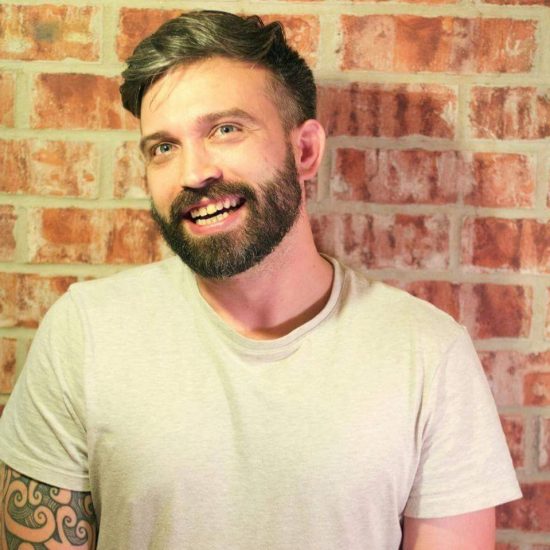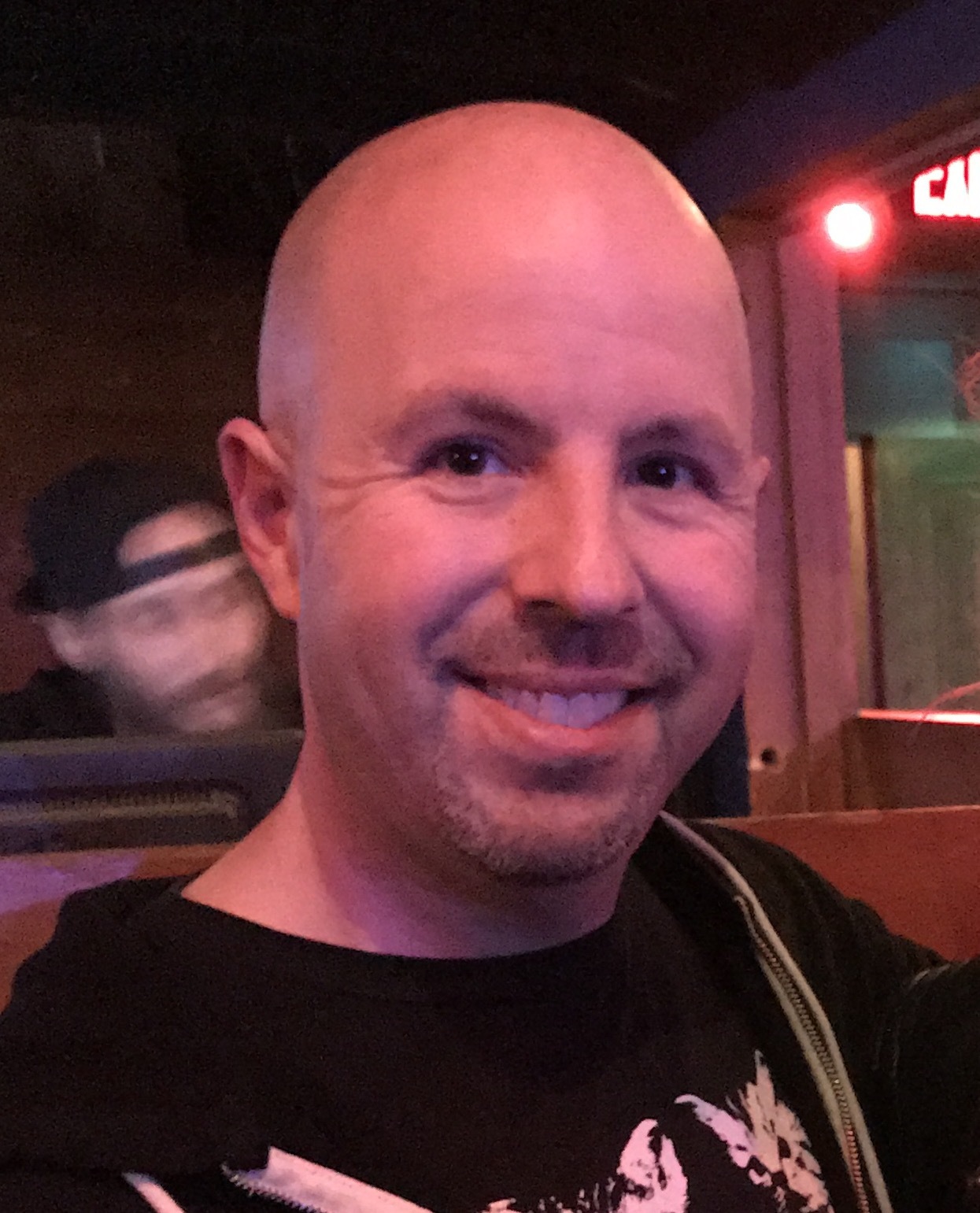
Jered McCorkle: Comedy Provocateur
March 22, 2019
There’s a phenomenon in psychology called the “Baader-Meinhof effect”.
It’s when you hear or see something and take notice, and then it seems that everywhere you go, and in everything you see, that thing appears to come up with an unusually high frequency; in fact, this is also commonly called “frequency illusion”.
Given that this is not Psychology Today, I should note the actual reason I’m bringing this up is that this week’s guest, Jered McCorkle, is a name that, once I learned of him some time ago, it began to feel like every person we spoke with, or show we saw, had some connection to him.
In this case, it’s no illusion. McCorkle is – quite simply – an extremely active performer and creator in the Austin comedy scene. He’s founded or co-founded multiple showcases and open mics, including Bubble & Squeak, Fierce Mild, and Double Barrel; co-hosted podcasts like Leading the Blind and Circling the Drain; and is a 3‑time semi-finalist in Funniest Person in Austin. It’s a roster not often matched in the local scene, and, as we’ll see, there’s method to the madness of this kind of productivity.
Asking McCorkle about the start of all things comedy in his life, he’s quick to jump to early memories of his rural Georgia upbringing, and experiencing the comedy of the great George Carlin. A chance VHS (Google it, if need be) rental in McCorkle’s early years (after some convincing of his father) of one of the sight-unseen comedian’s specials grew rapidly into a love of Carlin’s work that would shortly lead to seeing him on tour.
He describes this discovery thusly: “To me, [Carlin] was a guy who ‘thought weird’…I didn’t think ‘this is how you be a comic’; I thought ‘this is how you be a person’.” While it may seem unconventional for a parent to support someone so young being exposed to comedy that can be quite edgy, I can say from my own experience with my daughter that McCorkle is spot-on. Cursing and rants be damned, it’s the power of hearing unique points of view on life that can be just as important and transformative as the humor, for someone still growing into their own perspectives and ways of interfacing with the world. And few fit that bill better than George Carlin.
“To me, [Carlin] was a guy who ‘thought weird’…I didn’t think ‘this is how you be a comic’; I thought ‘this is how you be a person’.”
Jered McCorkle
Despite this early interest, comedy proper wouldn’t dominate McCorkle’s life until much later. At this time, he was still testing life directions using an extremely scientific method, saying: “I wanted to be whatever got me attention when I said it to adults.” It was a method, at least. High school and college also took some circuitous paths for McCorkle, leaving him in a continued quandary about his long term goals, paired with the challenges of still being – for all intents and purposes – a closeted young gay man. He was at a loss, in need of changes and structure, skills to bring empowerment and order to his life where he needed it most.
Then came 9⁄11.
The idea of military service, brought to the forefront by the dark days following the attacks, offered much in the way of those skills that McCorkle had yet to master. Routine, direction, and discipline are potent components in the recipe of developing confidence and productivity. So McCorkle joined, along with many who turned their eyes to service in the aftermath, choosing to follow a 6 year plan that would lead to the Special Forces arm. As expected, the time served, served him well. ”The military…did fix me; I would not be capable…of living a life on my own,” he says, only half jokingly. This was also still the “don’t ask, don’t tell” era, so his sexuality remained a more secretive aspect of his persona.
The violence and very real risks in the field with urban war tactics ultimately led McCorkle to exit his term when he had the option. Back in civilian life, time had arrived for him to bring the suspense and tension of the unknown into a completely different setting: behind the mic. McCorkle’s style was something he connected with quickly: sharp turns, and keeping the audience in heightened suspense. Shades of this came from other comics he’d come to admire, like Bill Hicks and Mitch Hedberg, masters of the turnabouts themselves.
None of this to say the early days were easy; knowing what you want and achieving it are two distant concepts. “I still think this is all magical,” he recalls, as he started to foray into watching more open mics, and ended up taking the stage the first time, completely unprepared, to fill a slot when a show was coming up short.
It wasn’t a perfect set; the first ones never are, but it had enough of the magic elements endemic to stand-up that McCorkle knew his life had changed irrevocably for the better. “It was like this tremendous weight just lifted off my shoulders,” he remembers, and, walking back to his seat, decided “I’ll be a comic ‘til I’m dead.” In a bit of foreshadowing, the joke that worked best for him that first night would go on to win the coveted Joke of the Night in Funniest Person in Austin contest years later.
“It was like this tremendous weight just lifted off my shoulders…[I decided] I’ll be a comic ‘til I’m dead.”
Jered McCorkle
Finding this new and lasting purpose, and finally able to live as the person he always suspected he was, and hoped to be, gave McCorkle a new zest for life. His fans will no doubt note that with this came a bit of a headstrong, swaggered, approach to social media and in his act. Learning the difference between being a comedian and a provocateur proved crucial, and supportive players in the Austin scene helped him realize the changes that would shape him into the comic that began building a growing appeal, and taking on challenges like competing in FPIA. Now, it wasn’t as if a glittering and golden brick road appeared, leading directly to proficiency and stardom; there were more lessons to learn and talents to grow, and McCorkle shares universal – and personal – moments and concepts that will benefit other performers, aspiring or seasoned.
Speaking of roads, McCorkle let us in on the news that he may be embarking on his version of the Comedy Migration soon. Come August, New York may be his new home, as he plans to hone and polish his body of work, in the way that perhaps only the city that never sleeps can provide the required endless opportunities to perform, validate, and refine your content.
While McCorkle may be looking to the future, slowing his showcase work in Austin, he’s not by any means idle. He recently started a new podcast, FANtom Zone, where he and friends opine on comics of a different kind: the illustrated and bound medium, where some of McCorkle’s other childhood heroes, like Thor, spend their days. It’s intended to appeal to neophytes in that genre as much as seasoned readers who know exactly when New Comic Day is.
Our time with McCorkle has been a while coming, and more than delivers; we’ve covered significant ground here and it’s barely a taste of what he shares with Valerie in the interview. Listen to the episode for more on FPIA experiences and tips, how he reconciles mixing his sexuality into his material, stories of your favorite Austin comics (new and old), and more wisdom from a man who’s logged many a mile in the Austin comedy community.
And whither McCorkle finally lands on terra firma, after however many more miles, we have no doubt he’ll keep putting that hard-earned ethic and passion to good use.
—
Catch Jered McCorkle at these upcoming shows:
- March 23rd: Chortle Portal

Valerie Lopez

Richard Goodwin
